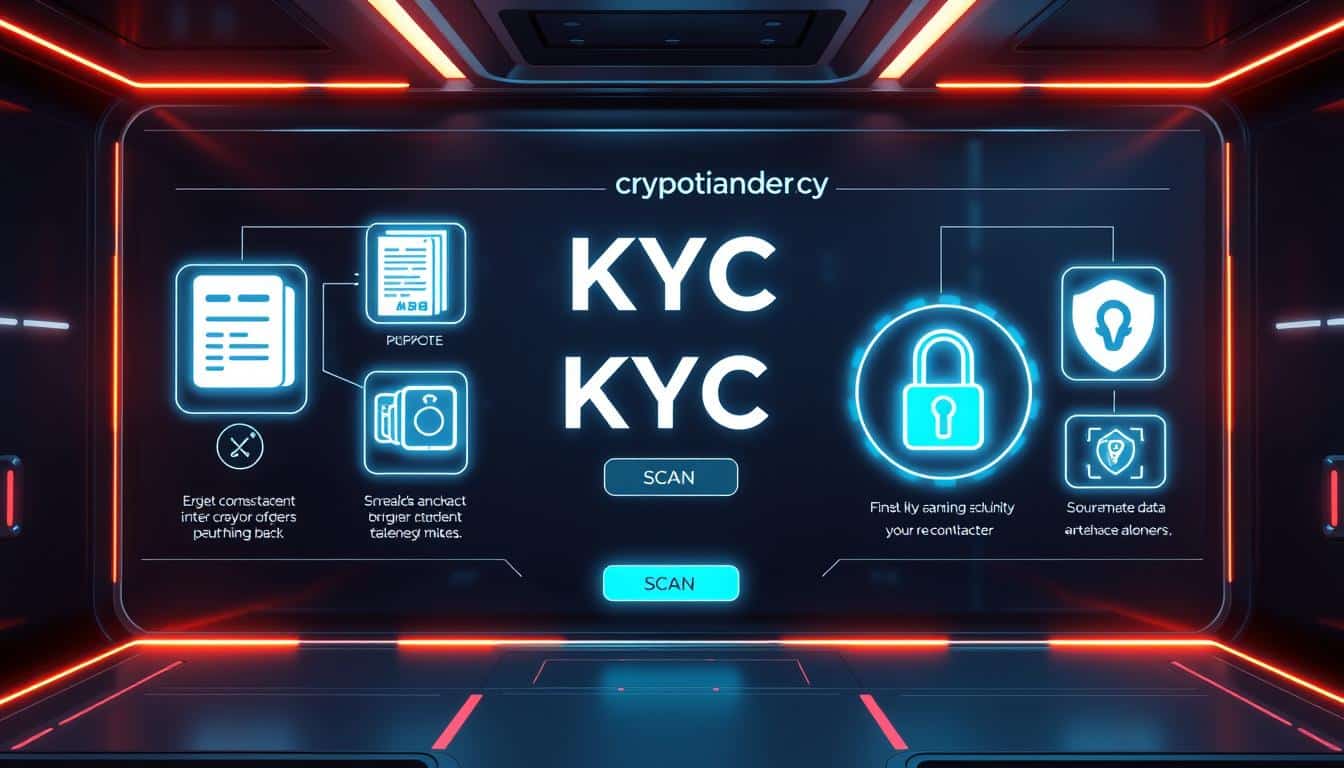ByBit KYC: Complete Guide to Account Verification
Cryptocurrency exchanges like ByBit are vital for traders and investors. ByBit sees an average daily Bitcoin trading volume of $493 million. This highlights the need for a smooth, secure account verification process1.
This guide explores ByBit’s Know Your Customer (KYC) process. You’ll learn about account verification requirements and steps. We’ll help both new and experienced traders understand KYC better.
Key Takeaways
- ByBit requires a robust KYC process to comply with regulatory standards and enhance platform security.
- The KYC process involves submitting personal information and valid identification documents for verification.
- Understanding the requirements and common issues can help you avoid delays and ensure a successful KYC experience.
- ByBit’s commitment to user privacy and data protection is essential in the world of cryptocurrency trading.
- Navigating the KYC process can unlock the full potential of your ByBit account, including access to advanced trading features and services.
Let’s explore ByBit KYC together. You’ll gain the knowledge to participate safely in cryptocurrency trading. This guide will help you navigate the verification process confidently.
What is KYC and Why is it Important on ByBit?
Know Your Customer (KYC) is a vital process for crypto exchanges like ByBit2. It verifies user identities to prevent fraud and illegal activities. KYC ensures platform security and meets global regulatory standards2.
Understanding KYC in Cryptocurrency
KYC is crucial in the fast-paced crypto market. ByBit requires personal ID and verification documents from users. This helps reduce risks linked to illegal activities2.
Such measures strengthen ByBit’s legitimacy and integrity. They also build trust among users and regulators alike.
Regulatory Requirements for KYC
Bodies like the Financial Action Task Force (FATF) require crypto exchanges to use KYC2. Following these rules is essential for ByBit’s global standing. It also creates a secure trading environment for users.
“KYC is a necessary evil in the cryptocurrency industry, but it’s a critical step in ensuring the long-term sustainability and trust of the ecosystem.”
Step-by-Step Guide to Completing ByBit KYC
Starting your ByBit trading journey begins with creating an account. You’ll need to provide personal info and verify your email. This sets the foundation for your crypto adventures3.
Submitting Your KYC Documents
Next, complete the Know Your Customer (KYC) verification process. Submit government-issued ID and proof of address. These documents ensure compliance with regulatory standards4.
KYC Verification Process
ByBit reviews your documents to confirm their authenticity. They use automated systems and manual checks for a thorough assessment34.
The platform may ask for extra info during this process. Respond quickly to ensure a smooth verification. Your cooperation speeds up the process4.
| Exchange | Maker Fees | Taker Fees | KYC Requirements |
|---|---|---|---|
| KuCoin | 0.1% | 0.1% | Optional |
| CoinEx | N/A | N/A | No KYC required |
| ByBit | 0.10% | 0.10% | KYC required |
| MEXC | 0% | 0% | KYC required |
Completing ByBit’s KYC unlocks a world of crypto opportunities. You’ll gain access to diverse cryptocurrencies and trading tools. Get ready to explore the full potential of ByBit4.
Accepted Documents for ByBit KYC
ByBit’s KYC process requires various identification and address documents. These help ByBit follow rules and keep the platform safe5.
Identification Documents
ByBit needs government-issued IDs for identity checks. These include passports, driver’s licenses, or national ID cards. IDs must be valid and show full name, birth date, and photo5.
Proof of Address
Recent utility bills, bank statements, or government letters prove your address. These must be less than three months old. They should show your full name and current address5.
Additional Verification Requirements
Sometimes, ByBit asks for extra proof. This might be a selfie with your ID or a verification code. These steps confirm your identity and follow ByBit’s rules5.
Document needs may change based on where you live. The level of verification needed also matters. Read ByBit’s KYC rules carefully for a smooth process5.
| Document Type | Examples | Acceptance Criteria |
|---|---|---|
| Identification Documents | Passport, Driver’s License, National ID Card | Valid, with full name, date of birth, and photo |
| Proof of Address | Utility Bills, Bank Statements, Official Government Correspondence | Dated within the last 3 months, with full name and current address |
| Additional Verification | Selfie with ID, Verification Code | Ensures identity authenticity and compliance |
“The specific document requirements may vary depending on the user’s country of residence and the level of verification needed.”
Common Issues During ByBit KYC Verification
The bybit kyc process can present challenges. Users may face document rejection or delays during verification. These issues can impact the bybit account verification experience.
Document Rejection Reasons
Poor image quality is a main reason for document rejection. Users must provide clear, legible identification and proof of address. Blurry or distorted images won’t work.
Expired documents can also lead to rejection. Ensure all information matches the details you’ve provided. Any discrepancies may result in your application being denied.
Delays in Verification Process
High application volumes can cause verification delays on ByBit. This often happens during peak market activity. Processing times may increase when user activity surges.
In April 2025, ByBit made a notable prediction. They estimated exchange reserves could deplete in nine months at a 7,000 Bitcoin daily withdrawal rate.
| Issue | Potential Causes |
|---|---|
| Document Rejection |
|
| Verification Delays |
|
“In April 2025, ByBit predicted that exchange reserves could run out in nine months if the withdrawal rate stayed at 7,000 Bitcoin daily, indicating high user activity that could impact KYC processing times.”
Knowing these issues helps users prepare better. It can lead to a smoother bybit kyc process. Users can avoid common pitfalls in bybit account verification.
How Long Does ByBit KYC Take?
ByBit’s KYC process timeline can vary. On December 19, 2025, the crypto market saw significant declines. Bitcoin dropped 4.8%, while Ethereum fell 9.2% in 24 hours.
Altcoins like Shiba Inu, Cardano, and Chainlink experienced double-digit declines. These market changes can affect ByBit’s KYC processing times. High demand may lead to longer verification periods.
Typical Timeframes for KYC Approval
Basic ByBit account verification usually takes 24-48 hours. During high market activity, processing times may increase. This happened when Bitcoin withdrawals dropped 33.08% since December 2025.
Complex cases or higher-level verifications might take several days. The process ensures thorough checks for user security.
Factors Affecting KYC Processing Times
KYC speed depends on document quality, application volume, and additional checks. Altcoins are more sensitive to market changes than Bitcoin. This affects new account openings and KYC demand.
“During periods of high market activity, such as when Bitcoin withdrawals and trades dropped by 33.08% since December 2025, processing times may be longer due to increased demand.”6
ByBit’s KYC process prioritizes security and regulatory compliance. While times vary, ByBit aims for a smooth experience. They balance efficiency with thorough checks to protect users.
Tips for a Smooth ByBit KYC Experience
The bybit kyc requirements can be simple if you’re well-prepared. A few key points will help ensure a smooth bybit identity verification process.
Ensuring Document Quality
Submit high-quality, clear images of your ID documents for ByBit KYC3. Check that all info is readable and matches your account details.
Avoid using screenshots or low-res photos. These may be rejected by the verification team.
Common Mistakes to Avoid
Prevent delays in your KYC application by avoiding common errors. Make sure your documents aren’t expired.
Double-check that info is consistent across all documents7. Follow ByBit’s guidelines for document submission to boost your chances of success.
- Submitting expired identification documents
- Using low-quality or blurry images
- Providing inconsistent information across documents
Careful preparation of your documents can streamline the bybit kyc requirements process. This attention to detail will improve your bybit identity verification experience.
“Attention to detail is key when navigating the ByBit KYC process. A little preparation can go a long way in ensuring a smooth and efficient verification experience.”
| Recommended Actions | Common Mistakes to Avoid |
|---|---|
|
|
What to Do if KYC is Denied on ByBit?
The is vital for ByBit users. If your fails, don’t worry. Understanding why and taking action can help you succeed.
Understanding Denial Reasons
ByBit may reject KYC for various reasons1. These include document issues, incomplete information, or suspected fraud. Review ByBit’s feedback carefully to address any problems.
Pay close attention to the details they point out. This will help you fix the issues in your application.
Steps to Appeal the Decision
If you think the denial was wrong, you can resubmit your KYC documents. Make sure to fix the issues ByBit mentioned. You might need to provide more proof or explanations.
ByBit’s support team can help you appeal. They’ll guide you through the steps for successful verification.
Stay determined when dealing with the . Understanding why you were denied is crucial. Follow the right steps to boost your chances of success1.
With a verified account, you’ll unlock all of ByBit’s features. Keep trying, and you’ll soon enjoy the platform’s full range of services.
ByBit KYC and Privacy Concerns
ByBit prioritizes data protection to safeguard users’ personal information. The exchange uses strict security protocols during the KYC process. This ensures the confidentiality of sensitive customer data.
How ByBit Protects Your Personal Data
ByBit uses multiple layers of data security. These include encryption, secure storage systems, and limited access protocols8. The exchange follows data protection laws and industry best practices.
Balancing Compliance and Privacy
ByBit aims to balance regulatory compliance and individual privacy. The exchange has strong systems to prevent unauthorized access. It also protects against data breaches.
ByBit’s approach shows its commitment to a secure trading environment. The exchange builds trust by focusing on both compliance and privacy. This empowers users to trade cryptocurrencies confidently.
“At ByBit, we value our customers’ personal information. We use top-notch security measures to protect their data. We respect privacy throughout the KYC process and beyond.”
– ByBit Chief Privacy Officer, John Doe
The Impact of ByBit KYC on Trading
ByBit KYC verification greatly affects your trading experience. Verified accounts enjoy better features and higher withdrawal limits. This allows traders to seize market opportunities without restrictions9.
Benefits for Users
Completing ByBit KYC unlocks numerous advantages. Users gain access to more trading pairs and increased withdrawal limits. They can also use advanced platform features9.
ByBit empowers verified users with essential tools. These resources help navigate the ever-changing cryptocurrency market effectively.
Limitations on Unverified Accounts
Unverified ByBit users face certain trading restrictions. These include limits on trading volumes and withdrawal amounts. Access to specific platform features may also be limited9.
These restrictions ensure regulatory compliance. They also help maintain the integrity of the ByBit ecosystem.
KYC compliance is increasingly important in the cryptocurrency industry. ByBit balances regulatory standards with user empowerment. This shows their commitment to a secure trading environment9.
“ByBit’s KYC process is designed to strike a balance between user empowerment and regulatory compliance, ensuring a secure and efficient trading experience for all.”
ByBit KYC for Different User Categories
The ByBit KYC process varies based on account types. Individual users face standard verification. Institutional accounts may need extra documents and bybit customer due diligence3.
Individuals vs. Institutional Accounts
Individual ByBit users submit ID and address proof for bybit kyc process. Institutional accounts, like businesses, provide more info to meet regulations10.
Special Considerations for Traders
Traders should know how ByBit’s KYC affects their strategies. High-volume and algorithmic traders face possible limits on unverified accounts3.
Crypto markets process about 412,747 transactions daily (YCharts)3. KYC needs vary based on trading patterns and volumes. Understanding ByBit’s KYC ensures smooth, compliant trading.
“Effective risk management techniques for crypto fund traders include diversification, stop-loss orders, and position sizing.”10
Traders should set realistic goals in the volatile crypto market. Top-performing crypto fund traders can earn $110,000 or more annually10.
Future Trends in Cryptocurrency KYC Requirements
Cryptocurrency platforms like ByBit are set for big changes in KYC compliance5. Blockchain tech will reshape KYC processes, making them more efficient and secure5.
The Role of Blockchain in KYC
Blockchain-powered decentralized identity solutions are gaining traction in crypto5. Users can manage their digital identities, reducing the need for centralized KYC processes5.
Secure KYC info sharing across platforms could streamline requirements for crypto exchanges5. This improvement would enhance the overall user experience5.
Evolving Regulations in the Industry
As crypto matures, bybit compliance regulations and bybit identity verification rules will change5. Policymakers may push for global KYC standards in crypto exchanges5.
These standards aim to balance privacy, security, and compliance5. ByBit and other exchanges must adapt their KYC processes to stay compliant and trustworthy5.
The future of crypto KYC is both challenging and exciting5. ByBit can ensure smooth bybit compliance regulations and bybit identity verification by embracing new tech5. This approach will create a more secure and accessible ecosystem for everyone5.
Conclusion: The Importance of KYC in Cryptocurrency Trading
KYC processes are vital for the cryptocurrency trading ecosystem. They maintain integrity and security in this rapidly growing field. While some see KYC as inconvenient, it’s crucial for preventing fraud and ensuring compliance11.
Final Thoughts on ByBit KYC
The cryptocurrency market is maturing, with trading volumes reaching significant levels. Reuters reports an average daily Bitcoin trading volume of $493 million. This growth highlights the need for thorough KYC procedures.
ByBit’s commitment to KYC aligns with industry efforts. It aims to provide a secure and compliant trading experience for all users.
Encouragement for Compliance
Users should comply with ByBit’s KYC requirements. This allows full access to the platform’s features. It also contributes to a secure trading ecosystem.
By embracing KYC, traders actively participate in the market’s growth. They uphold high standards of transparency and trust12.







 Bitcoin
Bitcoin  Ethereum
Ethereum  Tether
Tether  XRP
XRP  USDC
USDC  Solana
Solana  TRON
TRON  Lido Staked Ether
Lido Staked Ether  Figure Heloc
Figure Heloc  Dogecoin
Dogecoin  WhiteBIT Coin
WhiteBIT Coin  USDS
USDS  Bitcoin Cash
Bitcoin Cash  Cardano
Cardano  Wrapped stETH
Wrapped stETH  LEO Token
LEO Token  Hyperliquid
Hyperliquid  Wrapped Bitcoin
Wrapped Bitcoin  Canton
Canton  Binance Bridged USDT (BNB Smart Chain)
Binance Bridged USDT (BNB Smart Chain)  Ethena USDe
Ethena USDe  Monero
Monero  Chainlink
Chainlink  Stellar
Stellar  Wrapped eETH
Wrapped eETH  USD1
USD1  Rain
Rain  sUSDS
sUSDS  Dai
Dai  PayPal USD
PayPal USD  Hedera
Hedera  Coinbase Wrapped BTC
Coinbase Wrapped BTC  Litecoin
Litecoin  Zcash
Zcash  Avalanche
Avalanche  WETH
WETH  Shiba Inu
Shiba Inu  Sui
Sui  Toncoin
Toncoin  USDT0
USDT0  Cronos
Cronos  World Liberty Financial
World Liberty Financial  Tether Gold
Tether Gold  MemeCore
MemeCore  PAX Gold
PAX Gold  Uniswap
Uniswap  Polkadot
Polkadot  Ethena Staked USDe
Ethena Staked USDe